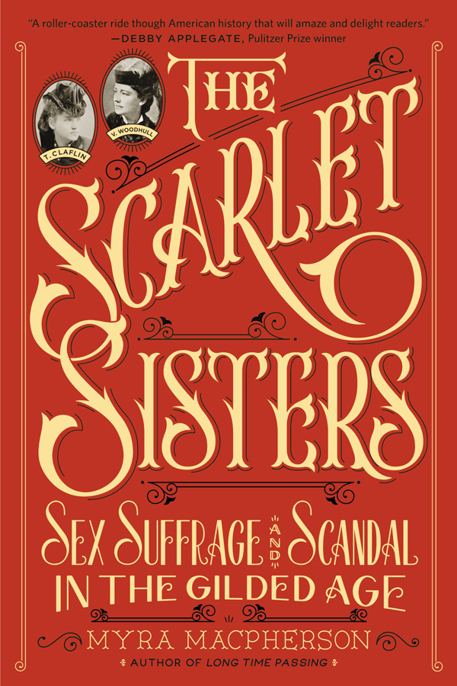
The Scarlet Sisters
Sex, Suffrage, and Scandal in the Gilded Age
- اطلاعات
- نقد و بررسی
- دیدگاه کاربران
نقد و بررسی

December 9, 2013
Beautiful and ambitious Victoria Claflin Woodhull and her sister, Tennessee (Tennie) Claflin, whirled into New York City in 1868, en route to becoming two of the most infamous women in America. After establishing themselves as spiritualists, they called on millionaire Cornelius Vanderbilt, a known believer in mediums. Vanderbilt, entranced by the two—especially Tennie, who became his lover—offered his support, and in 1870 the sisters opened Woodhull, Claflin and Co., the first female-owned brokerage firm. Their boldness attracted the attention of women’s rights activists, and they soon received a visit from the venerable Susan B. Anthony at their Wall Street office. Woodhull became involved in the suffrage campaign, but on her own terms—which often put her at odds with established organizations—and cemented her radical reputation when she publicly announced she was a free lover. She then exposed the marital infidelities of influential minister Henry Ward Beecher, leading to a sensational trial that ultimately drove the sisters out of the country. Journalist MacPherson (Long Time Passing) renders the Claflin sisters’ actions as high drama, parceling their lives into five acts complete with a list of a cast of characters, but even such stylistic overkill cannot dull the eternal sharpness of this dynamic sororal duo. Illus.

January 1, 2014
Such issues as a woman's right to make free sexual choices and her decision to run for president provoke spirited discussions these days; they were explosive topics in the 19th century. While there have been numerous studies of Victoria Claflin Woodhull (1838-1927), this is the first book to treat her sister Tennessee "Tennie" Claflin (1844-1923) thoroughly as well. Born in poverty, with little education, the sisters first gained notice as healers and spiritualists. Come 1870, they opened a brokerage firm in New York, to great success. It enabled them to start their own newspaper, Woodhull & Claflin's Weekly, advocating for the rights of women and for personal freedoms as they did likewise on the lecture circuit. The sisters famously exposed an adulterous affair between noted pastor Henry Ward Beecher and a parishioner. They courted controversy, both challenging and charming contemporaries. Victoria ran for president in 1872. MacPherson (Long Time Passing: Vietnam and the Haunted Generation) guides readers through the lives of these two women and their relationships with fellow activists such as Frederick Douglass and Elizabeth Cady Stanton. VERDICT This engaging and very accessible study, based on considerable primary and secondary research, is recommended to all readers looking to study Victoria Woodhull in the context of her partnerships with her sister and their broader lives together and apart.--Theresa McDevitt, Indiana Univ. Lib., PA
Copyright 2014 Library Journal, LLC Used with permission.

February 1, 2014
Sensational doesn't begin to describe the over-the-top reaction that greeted every aspect of the lives of nineteenth-century America's two most controversial sisters. Flamboyant, outspoken, opportunistic Victoria Claflin Woodhull and her younger sister, Tennie, were self-aggrandizing scene-stealers who tangled with Henry Ward Beecher, swindled Cornelius Vanderbilt, and antagonized Susan B. Anthony. Yet for all their pomp and bombast, they were unrepentant champions of equal rights for women in everything from the bedroom to the boardroom, the voting booth to the battlefield. Dismissively patronized by men for being empty-headed fripperies and scathingly ostracized by women for their unladylike bravura, the sisters courageously battled such defamatory characterizations to bring their controversial views on monogamy and suffrage to packed lecture halls throughout the country. MacPherson draws a detailed portrait of the roller-coaster, rags-to-riches lives of two backwoods country girls who, seeking to better their own situation, hoped to do the same for women everywhere. Sadly, MacPherson concludes, many of their causes remain little changed 150 years after their tireless campaigns began.(Reprinted with permission of Booklist, copyright 2014, American Library Association.)




دیدگاه کاربران